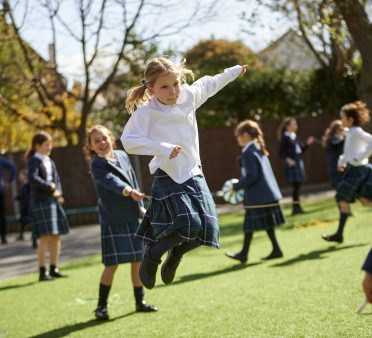Why should you enrol your daughter in prep school?
When it comes to choosing state or private, you may be wondering whether the latter is really worth the investment. Although the idea that learning takes place everywhere may be accurate, it’s worth noting the quality of education and level of pastoral care can vary hugely between schools.
Enrolling your daughter in a prep school may be firmly on your agenda or something that you’re simply in the first stages of considering. Below explains the top five reasons why enrolling your daughter in prep school education will be of huge benefit to them.
What is a prep school?
A preparatory school is a private educational institution where learning prepares pupils for senior school, and notably, the 11+ (or similar) exams required to get a place at one. Some prep schools cater for children from 4-13, while others are 4-11 or 7-13.
Top five reasons why you should enrol your daughter in a prep school
Below are the top five reasons you need to consider before researching your local prep schools further:
1. Nurturing, family environment
By nature, prep schools have fewer pupils than state schools because they tend to limit their class sizes and keep them small. As a result, there tends to be a much higher sense of community with many prep schools having a family feel to them.
This small school environment allows teachers to know all pupils, which builds a strong sense of trust and willingness to engage amongst children. If a child is addressed by their name and respects all their teachers, they are more likely to listen, follow instructions and appreciate the boundaries that are set within the school.
2. Involving the parent more
A huge difference for parents between prep schools and state schools is that while the state offers their child a free education, prep schools are fee-paying. While scholarships and bursaries are available to some pupils, it is unsurprising that if you are paying for your child’s education, you want the opportunity provide feedback and voice your opinion on how the school is operating.
At Falcons Girls, we have a very active and welcoming Parents and Friends Association, with a parent in each year group acting as a representative on the committee. In this way, all parents are able to suggest ideas for fundraising activities, what resources should be purchased for the school and how to engage the school community as a whole.
In addition, we send out parent surveys every term and we also did this during and after our remote education phases. Parent feedback is hugely important as it ensures parents feel listened to and valued. We recognise it is vital to take on board their suggestions, and consider positive and negative comments, as both will help shape the future of the school – be it the curriculum, school lunches, after school clubs, trips and how we communicate with them.
Of course, it is also vital to offer parents the opportunity to speak one-to-one with their daughter’s class teacher or a more senior member of staff, should they wish to raise any concerns about their child’s wellbeing or academia. Prep schools are much better positioned to do this, given the smaller pupil roll.
3. Smaller classes
Small class sizes ensure that children have plenty of space and can learn in a comfortable, well-ventilated room. This also allows teachers to more freely and easily access all areas of the classroom, giving them the ability to oversee all pupils and the progress they are making in each lesson.
With fewer children in the room, every child is given more opportunity to contribute to class discussions, answer questions and ask for further clarification, should they require it. This helps to build a greater bond between teachers and pupils, increasing classroom engagement and making lessons fun and interactive.
With fewer pupils in each class, it is also possible to have elevated levels of pastoral care, with changes in behaviour or mood among children much easier to detect. This is also true for academic achievement – if a child appears to have additional learning needs or starts to progress at a slower pace than their peers, teachers are able to make the necessary adjustments to their provision much quicker than if they were teaching a larger group of pupils.
Now more than ever, we are aware of how close we are to others and the impact a lack of physical distancing can have on health. Spacious classrooms with smaller class sizes ensures children can safely distance, lowering the risk of transmission of colds and viruses.
4. Higher level of academic attainment
As prep school curriculums are aimed at preparing children for their 11+ exams during Year 6, it is not a myth that their pupils tend to flourish academically when compared to those who attend state school. That is not to say that state education is insufficient but rather that prep schools strive to push a child to excel in a variety of subjects plus they have the capacity to tailor their provision to individuals so they can achieve the best results.
At Falcons, we combine academic rigour with exciting, interesting co-curricular opportunities so that girls not only achieve highly in traditional subjects but also in the likes of Art, Drama, Music and Sport. By providing them with the scope to engage in creative and social subjects, they are capable of engaging at a higher level with subjects such as English, Maths, Verbal and Non-Verbal Reasoning – all of which are taught with 11+ exams firmly in mind from Year 3.
5. High quality resources
Gone are the days when resources for schools just referred to books. It’s also worth considering what facilities and equipment a school has to offer. Does it have a science laboratory? Dedicated IT facilities with modern computers? Art classrooms? Do the children have access to a device such as an iPad while in school? These are all things we offer at Falcons, which allow us to provide a broad range of engaging, fun and interesting lessons such as Coding that do not only take place in a conventional classroom setting.
As prep schools are fee-paying, schools tend to be able to purchase and maintain better quality facilities and resources, which are accessible to all pupils. A larger state school for example, may have a science laboratory but only be able to offer it to certain year groups, given the large class sizes. Prep schools have the capacity to ensure pupils across all or a wider number of year groups benefit from the extensive facilities they have at their disposal.
Conclusion
Selecting a school is never an easy decision to make and as there are so many to choose from, it is easy to get overwhelmed by the options. If you are unsure whether prep school education would be suitable for your child, consider what opportunities it would bestow them. If you’re concerned about finances, be sure to research bursaries and scholarships as many schools offer these too.



